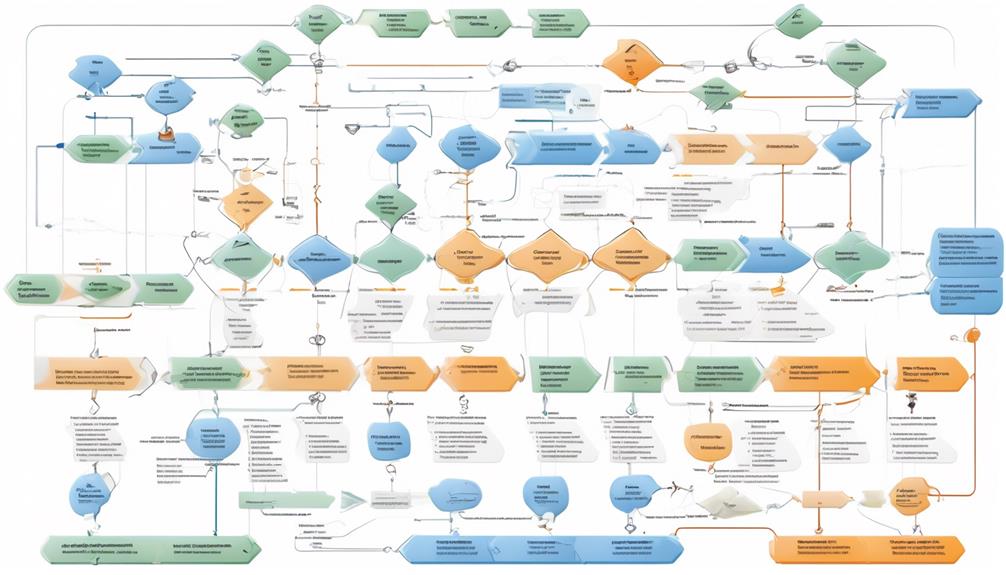As the saying goes, the small details can have a significant impact, particularly within Software Quality Assurance (SQA) teams. The specific roles and responsibilities within these teams are highly critical. This includes collaborating closely with manual testers and developers to ensure comprehensive testing, and continuously enhancing testing methodologies. The role of an SQA team is diverse and essential to the success of software development projects.
But what exactly do these roles entail, and how do they contribute to the overall quality of the end product? Let's unravel the intricacies and explore the key components that make up an effective SQA team.
Key Takeaways
- SQA ensures software development meets industry standards and enhances company image and reputation.
- QA Managers are responsible for developing and implementing test plans, managing software development processes, and serving as a liaison with clients.
- QA Leads oversee the entire testing process, develop and implement the testing strategy, and coordinate software testing processes.
- QA Analysts analyze system requirements, create comprehensive test plans and cases, execute tests, and communicate effectively with stakeholders about the status and progress of the QA systems.
Importance of SQA in Software Development
SQA plays a critical role in ensuring that software development meets industry standards and enhances the company's image and reputation. The importance of SQA in software development can't be overstated.
SQA teams are responsible for upholding the quality of the entire software development process. This includes defining and implementing QA processes, planning and executing testing activities, and ensuring overall product quality.
The roles and responsibilities of QA engineers within SQA teams are multifaceted, encompassing not only the technical aspects but also strategic decision-making to guarantee a high standard of quality.
Key Roles in SQA Teams

Analyzing, defining, and ensuring that requirements are met are key responsibilities of QA professionals within SQA teams. In addition to these responsibilities, there are specific roles within the QA team that contribute to the overall quality assurance process. The table below outlines the key roles and their respective functions within SQA teams:
| Role | Responsibilities | Skills Required |
|---|---|---|
| QA Manager | Oversees the entire QA team, serves as a client liaison, and ensures the quality of the final product. | Leadership, communication, QA expertise |
| QA Lead | Assists the manager in planning, managing test activities, and monitoring quality deliverables. | Planning, coordination, technical skills |
| QA Analyst | Executes and evaluates software systems, writes issue resolution documentation, and reports testing results. | Analytical, troubleshooting, reporting |
These roles are essential in the software development process as they contribute to maintaining the quality of the product. The QA team works collaboratively to document testing results, analyze errors, and troubleshoot failures, ensuring that the software meets the specified requirements and standards. This demands a combination of technical expertise, communication skills, and a thorough understanding of the software development process.
Responsibilities of QA Managers
As we move into the discussion of 'Responsibilities of QA Managers', it's crucial to understand the pivotal role they play in overseeing the entire QA team, ensuring adherence to quality standards, and managing testing strategies and plans.
QA managers are responsible for developing and implementing test plans, ensuring that software testing processes align with industry best practices, and managing software development processes. They play a crucial role in maintaining the overall quality assurance by supervising the activities and performance of software Quality Assurance engineers.
Additionally, QA managers serve as a liaison with clients, ensuring that the deliverables meet quality standards and communicating progress and outcomes to stakeholders. Their responsibilities also include managing and supervising the QA team, providing guidance and support, and ensuring that the team is equipped with the necessary resources to execute their roles effectively.
Duties of QA Leads

Taking charge of the testing process, we as QA Leads are responsible for developing and implementing the testing strategy and overseeing the entire testing process to ensure the delivery of high-quality software products. As QA Leads, we plan the use of technical resources for testing and perform quality control on the testing process. We act as negotiators with the client regarding testing requirements, ensuring that their needs are met while maintaining the integrity of the software QA. Additionally, we supervise and coordinate the software testing processes, working closely with the test engineer and the QA team to manage software development and ensure that the quality assurance standards are met.
In addition to overseeing manual testing processes, QA Leads are also responsible for implementing and managing automated testing procedures. This involves identifying areas where automated testing can be beneficial, selecting appropriate tools, and ensuring that the automated tests are effectively integrated into the overall test management process.
Functions of QA Analysts
In our role as QA professionals, we diligently analyze system requirements and ensure their fulfillment, which naturally leads to the core functions of QA Analysts. Our primary function involves creating comprehensive test plans and test cases to validate software functionality. We meticulously execute these tests, documenting the results, analyzing any errors, and troubleshooting failures to ensure the quality and reliability of the software.
Additionally, we play a crucial role in quality control by monitoring the performance of the software and uncovering any vulnerabilities or weaknesses that may compromise its functionality.
As QA Analysts, we also have the responsibility to communicate effectively with stakeholders about the status and progress of the QA systems. This involves providing clear and detailed reports on testing results, issues encountered, and the overall quality assurance process.
Our functions are essential in supporting the overall objectives of the software testing team and ensuring that the software meets the required standards for performance, reliability, and user experience.
Frequently Asked Questions
What Is the Responsibility of Quality Assurance Team?
We ensure the responsibility of the quality assurance team is to uphold product quality through creating and performing tests, identifying errors, and providing feedback.
Our focus is on maintaining brand reputation, customer satisfaction, and ensuring the final product meets quality requirements.
We evaluate functionality and adherence to business requirements to guarantee the highest standards.
Our meticulous approach ensures the product's quality and reliability.
What Is the Role of Software Quality Assurance Team?
In the role of a software quality assurance team, we ensure that the product meets high standards.
We meticulously analyze, define, and execute test plans to identify and resolve issues.
Our proactive approach in documenting and communicating testing results enables us to provide valuable insights to stakeholders.
What Is the Responsibility of SQA Group?
Our responsibility as an SQA group is to ensure that software meets quality standards by testing, analyzing, and documenting results.
We monitor performance, identify vulnerabilities, and support issue resolution. Our role is crucial in maintaining the integrity and functionality of software systems.
We collaborate with various team members to execute and evaluate testing procedures, ensuring that the software meets client requirements and industry standards.
What Is Your Role in a Team as a Qa?
As a QA team member, our role is to ensure the quality of the product by:
- Analyzing, defining, and meeting requirements.
- Planning and conducting testing.
- Documenting results.
- Communicating with stakeholders about QA systems and progress.
We also monitor performance and uncover system vulnerabilities. Our responsibilities are crucial in maintaining the integrity and functionality of the product.
Our attention to detail and strategic approach are essential in achieving mastery in our QA role.
Conclusion
In conclusion, the collaborative and comprehensive roles and responsibilities in SQA teams are crucial for ensuring the quality and efficiency of software development.
From identifying areas for test automation to continuously improving test processes, the SQA team plays a pivotal role in delivering high-quality software.
By staying updated with industry trends and best practices, SQA teams strive to streamline and strengthen software quality assurance.









